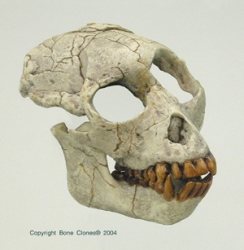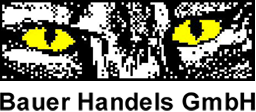Human: Phylogeny
Proconsul Skull
Proconsul africanus
Proconsul africanus Skull
14 to 23 MYA. The Proconsul africanus skull was discovered by Mary Leakey in 1948 on Rusinga Island, Kenya. This specimen, based on the 1948 Leakey discovery, is the most complete Proconsul africanus cranium to date. Alan Walker reclassified Proconsul africanus, a Miocene hominoid, as heseloni in 1993. The skull is characterized by the absence of browridges (unlike in modern apes) and the presence of a projecting face. Members of this genus are considered dental apes because their teeth possessed ape-like features. Their teeth also indicate that they were primarily a fruit-eating species. On the other hand, their limb skeletons share monkey-like features. The evidence provided by a wide range of skeletal remains points toward considerable variation within the genus Proconsul, their body size extending from the size of a small monkey to a female gorilla. They also inhabited a variety of environments from rainforests to open woodlands. The Bone Clones® Hominid line is composed of discoveries from anatomically modern humans, archaic humans, early Homo, early hominins, and other hominids. The majority of the casts in this line have been recreated by our team of anatomical sculptors. Some are reconstructions made by anthropology professionals using fragmentary elements from original discoveries and extrapolating the missing parts from those (i.e. Neanderthal skeleton). 2-part skull (separate cranium & jaw).
5" L x 3" W x 3" H 13.2L x 7.7W x 7.3H (cm)
A custom metal display stand is available on demand.
5" L x 3" W x 3" H 13.2L x 7.7W x 7.3H (cm)
A custom metal display stand is available on demand.




Manufacturer:
| Bone Clones |  |
Note:
Matching base available on request (part no. S-BH-023).
All prices plus VAT and shipping costs

